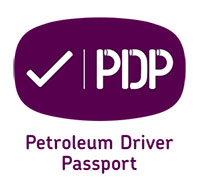Petroleum Driver Passport Scheme
 SQA's Petroleum Driver Passport (PDP) Scheme is an innovative example of bringing together businesses, individuals and other organisations to comply with a UK Government policy. The creative approach to developing the PDP and the enforcement arrangements that underpin it show how an industry can take the initiative and work with Government to provide its own solution.
SQA's Petroleum Driver Passport (PDP) Scheme is an innovative example of bringing together businesses, individuals and other organisations to comply with a UK Government policy. The creative approach to developing the PDP and the enforcement arrangements that underpin it show how an industry can take the initiative and work with Government to provide its own solution.
The challenge
In 2012, the UK haulage industry and the Government faced a crisis. Drivers of petroleum fuel tankers there were threatening strike action because of issues with terms and conditions — plus serious concerns over gaps in safety and training. Employers, trade unions, drivers and Government were unable to reach agreement on a solution and the UK economy faced a potential disruption to supplies. However, the arbitration service Advisory, Conciliation and Arbitration Service (ACAS) facilitated an agreement and one of its recommendations was the development and introduction of a new national safety standard for the industry.
The UK Department for Business, Energy & Industrial Strategy, (formally known as the Department of Energy and Climate Change), mandated the industry body UK Downstream Oil Distribution Forum (DODF) to review best practice in health and safety and driver training standards with a view to incorporating any recommendations into a new industrywide code of practice. DODF turned to SQA to develop and manage what has now become the PDP Scheme.
SQA bring valuable experience and expertise which will ensure the quality and credibility of the PDP.
The approach
SQA project-managed the development of the scheme, co-ordinating the output of representatives from DODF and a group of experts representing the haulage companies, unions, major employers, trade associations, Government, regulatory bodies and sector skills councils.
Purpose: to develop a consistently high level of classroom and practical training to all classes of petroleum tanker driver that sits within a system of industry accreditation and enforcement. In addition, the training was to be delivered in the most cost effective manner in order to ensure that all drivers are trained to the same high standard.
Output: drivers who achieve the standard and keep it up to date are issued with the Petroleum Driver Passport.

Tools and techniques
From the outset it was clear that the petroleum tanker industry had many examples of excellence in driver training. There was no common standard, however, to which all drivers were trained.
The PDP syllabus sets out the training required for drivers to complete three components that make up the PDP scheme.
- Assessment of knowledge
- Annual practical assessment of vocational competence
- Annual classroom training
The syllabus acts as a benchmark against which the development and revision of training programmes and practical assessments can be measured so that drivers are properly prepared for work in the sector and are able to approach PDP assessments with confidence. The PDP sets out the areas of training and assessment covering knowledge and practice within five key learning outcomes.
Relevant experience
SQA’s assessment development model is used to develop and validate PDP syllabus assessments.
The assessment development process is a continuous cycle of:
- Developing or revising content
- Validating revised and new content
- Deploying assessment content
- Monitoring the performance of assessment content
- Periodic review of assessment content
The quality assurance model ensures that training standards are maintained and improved.
SQA's quality assurance model can be summarised as:
- Approval of training centre
- Approval of training centre to offer ADR qualification
- Conduct monitoring visits to training centres
- Report on training centre performance
- Use report intelligence to inform future monitoring activity
Our assessment delivery model allows drivers access to assessments:
- Register candidates
- Issue identification key
- Schedule test
- Undertake test
- Issue results and certificate via photo identity card
How PDP works
PDP is more than a training standard, it’s a system of accreditation and enforcement:
- SQA approves all activity within the scheme — training centres, trainers, assessors
- Training centres carry out the training to approved standards
- SQA sets external assessments, which training centres invigilate
- SQA’s External Verifiers audit PDP activities
- SQA issues the Petroleum Driver Passport using the photo identification card
- PDP is enforced through the oil terminal operators
- Other relevant authorities and operators are made aware of PDP
The training standard and the system of accreditation and enforcement work together to create the PDP.
Benefits
- Drivers are consistently trained to a high standard.
- Employers have a standard against which to train all drivers.
- Oil terminals know that the PDP means drivers are appropriately trained.
- Training centres have a clear syllabus and strong accreditation and assessment process.
- Industry enjoys improved reputation, high standards in training and safety and its own pro-active code of practice.
Find out more about the Petroleum Driver Passport.
Related Information
Contact Information
Start your journey with SQA.
Thinking of offering an SQA qualification?
Get in touch to discuss your next steps and find out more.
